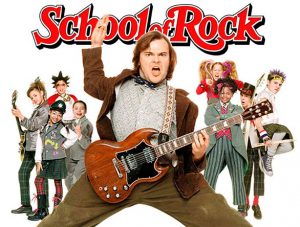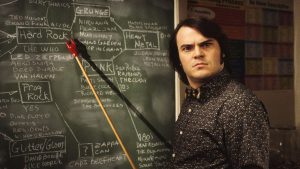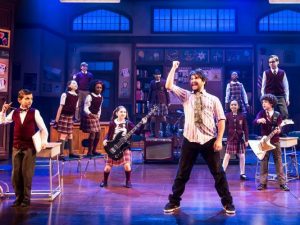 By Scott T. Allison
By Scott T. Allison
I just had the pleasure of watching School of Rock, performed on Broadway at the Winter Garden Theater. Years ago I had seen the movie version starring Jack Black, but this was before I had developed an interest in studying heroes. Since 2012, I’ve been reviewing the heroes in the movies at Reel Heroes, making it impossible for me not to scrutinize elements of the hero’s journey and heroic transformation in every story I encounter. So this time I observed School of Rock with a fresh set of eyes.
What is wonderfully apparent is that School of Rock features an impressive multi-layered hero’s journey — a true rarity in storytelling. The protagonist is Dewey Finn, a down-and-out rock musician who unknowingly sets his own journey in motion by pretending to be a substitute teacher. Finn’s a good guy, but he’s desperate to earn money and finds himself in over his head, unable to teach and unmotivated to even try. One day he hears his students playing classical music and becomes inspired to teach them the one thing he knows – rock’n roll.
Like many heroes, Finn’s initial motivation is a selfish one: he wants to use his students to win a band competition. But in the process of training his students, he discovers one of life’s consummate lessons,  namely, that when we help others, we transform ourselves. In coaching and developing his students’ musical abilities, Finn bonds with these children and defends them with passion when their parents fail to appreciate them. Finn discovers that his life purpose isn’t about making money but about helping others become their best selves.
namely, that when we help others, we transform ourselves. In coaching and developing his students’ musical abilities, Finn bonds with these children and defends them with passion when their parents fail to appreciate them. Finn discovers that his life purpose isn’t about making money but about helping others become their best selves.
The children, in turn, are hurled onto their hero’s journeys when Finn enters their lives and gives them a kind of self-confidence they’ve always lacked. The kids become skilled, poised musicians, but more than that, they become their true selves, finally able to express their hopes and frustrations through music. Finns’ students find their voice, not just in song but in their relationships with their parents. Their transformation is from stagnation to growth, from dependence to autonomy.
Finn transforms the children, and the children in turn transform their parents. These adults are first portrayed as cold, strict, narrow-minded, and/or unable to discern their children’s needs. The kids’ parents are appalled that Finn has misrepresented himself as a teacher and has corrupted their children with rock music. But at the band competition, they witness their children’s metamorphosis and are moved by their kids’ talent as musicians and growth as people. The parents are humbled and see their children through a new set of eyes – two telling signs of their  own transformation as individuals.
own transformation as individuals.
So there you have it — School of Rock’s three layers of transformations involving teacher, students, and parents. We witness the domino effect of heroic transformation. Once any one of us transforms heroically, it becomes impossible for us not to have a transformative effect on those around us. All of us are both the source of heroic transformation and target of heroic transformation, and the more conscious we are of these processes, the more we can use them to make the world better.
References
Allison, S. T., & Goethals, G. R. (2016). Hero worship: The elevation of the human spirit. Journal for the Theory of Social Behaviour, 46, 187-210.
Allison, S. T., & Goethals, G. R. (2017). The hero’s transformation. In S. T. Allison, G. R. Goethals, & R. M. Kramer (Eds.), Handbook of heroism and heroic leadership. New York: Routledge.
Allison, S. T., Goethals, G. R., & Kramer, R. M. (2017). Setting the scene: The rise and coalescence of heroism science. In S. T. Allison, G. R. Goethals, & R. M. Kramer (Eds.), Handbook of heroism and heroic leadership. New York: Routledge.
Allison, S. T., Goethals, G. R., & Kramer, R. M. (Eds.) (2017). Handbook of heroism and heroic leadership. New York: Routledge.
Allison, S. T., & Setterberg, G. C. (2016). Suffering and sacrifice: Individual and collective benefits, and implications for leadership. In S. T. Allison, C. T. Kocher, & G. R. Goethals (Eds), Frontiers in spiritual leadership: Discovering the better angels of our nature. New York: Palgrave Macmillan.
Goethals, G. R., & Allison, S. T. (2019). The Romance of heroism: Ambiguity, attribution, and apotheosis. West Yorkshire: Emerald.
– – – – – – – – – – – – – – – – – – – – – – – –